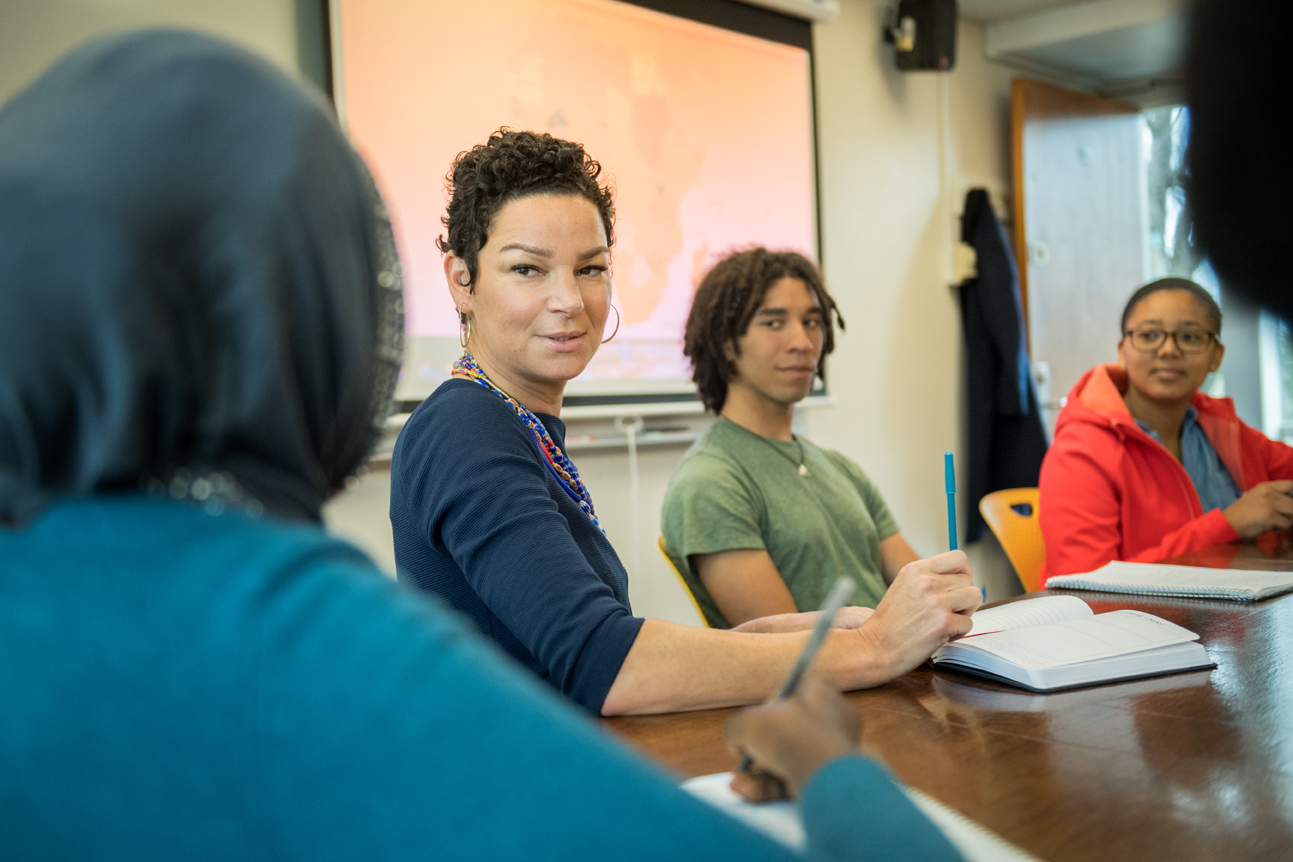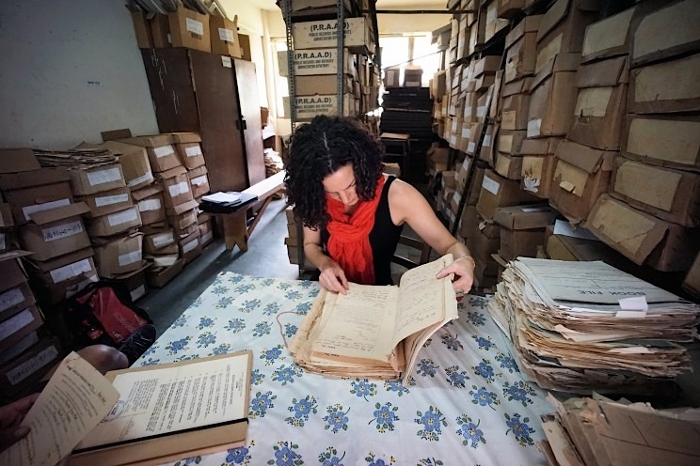Carina Ray fuses scholarship and teaching with personal experience
 Photo/linderpix
Photo/linderpixCarina Ray in the classroom
Almost 25 years ago, historian Carina Ray spent her junior year abroad as an undergraduate studying in Ghana. She planned to explore her Puerto Rican family’s African roots.
Most Ghanaians she met insisted she was white, despite her longwinded explanations about her multiracial background. Eventually, she realized it would be smarter to talk less and listen more.
“I was enthralled by what Ghanaians had to say about their own perceptions of blackness and how race works there,” says Ray, associate professor of African and Afro-American studies (AAAS). The seeds of Ray’s career were planted.
By the time she returned to the University of California, Santa Cruz, to finish her bachelor’s degree, Ray knew she wanted to study what it means to be black in West Africa — from an African perspective. The history of race in Africa was rarely written about from an African perspective, and it became the focus of her PhD in African history at Cornell University.
Today, Ray is one of the most innovative historians of Africa and the African diaspora, says AAAS chair Chad Williams. In addition to juggling teaching, research and publishing, Ray weighs in on current events in op-eds and articles on topics like student activism, war-crimes prosecutions, and revolution in Libya. Recently, she was a guest on a podcast for viewers of the ABC pseudo-reality television show, “The Bachelor” and its spinoffs, addressing the deadly history of interracial rape allegations.
“University scholars have to move beyond the small audience of fellow academics that tenure requirements force us to write for in very specialized ways. We risk becoming irrelevant otherwise,” Ray says. “The questions I’m interested in are meaningful to more than that small group of people. I have a duty to ensure that my research is made accessible, especially to those whose history it tells.”
|
|
|
Carina Ray researching in the Ghana National Archives |
Ray infuses her research and classroom teaching with personal experience and a knack for pursuing the little known and understood. “I want students to think about how their life experiences and unique viewpoints can inspire their own cutting-edge research agendas,” she says.
Among the many hats she wears, Ray feels especially passionate about her role as a teacher. She taught “Introduction to African History” in the fall and “African History in Real Time,” a new course funded by a Brandeis Library Technology Services Information Literacy Grant, is slated for the spring. With the assistance of librarian Laura Hibbler, students will explore current African news stories, learning how to locate and evaluate credible sources before placing them in historical context.
Over the first three weeks, the class will follow a set curriculum introducing the broad arc of African history; after that, the students will take a “fly by the seat of your pants” approach to absorbing and understanding the latest developments in Africa, Ray says. If the recent coup in Zimbabwe or the startling revelations of modern-day slave auctions in Libya are any indication, this course will tackle tough questions.
“She is a brilliant teacher who brings a unique blend of rigor and creativity to the classroom,” says Williams. “Her courses have already transformed the place of African history in the Brandeis curriculum.”
Ray’s first book, “Crossing the Color Line: Race, Sex and the Contested Politics of Colonialism in Ghana,” received the 2016 Wesley-Logan Book Prize for African Diaspora History from the American Historical Association, and was a finalist for the United Kingdom’s Fage and Oliver Book Prize in African Studies. It recently won the 2017 Aidoo-Snyder Prize for the best scholarly work written by a woman that prioritizes the experiences of African women from the African Studies Association Women’s Caucus.
Her next work, a three-part series, takes up questions of race, blackness and the body across the precolonial, colonial, and post-independence periods in Ghana.
She’s already uncovered one historical phenomenon that bears further research: skin bleaching. While it is usually understood as a postcolonial practice in West Africa, Ray has unearthed early 20th-century advertisements for skin “whitening” products in Gold Coast newspapers. She is trying to determine how the messages in the ads — which exclusively featured white women — shifted across race lines in colonial Ghana. Ray hopes that her work will add greater historical depth and understanding to a dangerous practice that puts large numbers of African women at risk of skin cancer and other ailments.
In addition to editorial appointments at the helm of Ghana Studies, the official journal of the Ghana Studies Association; and a new Cambridge University Press book series on African identities, she also serves on the board of editors of the American Historical Review, the discipline’s flagship journal. For Ray, editorial work, research, writing, publishing, and teaching are all facets of the same goal: reaching a broader audience.
“Over the years I’ve learned that it’s not enough just to produce great scholarship; you’ve also got to expand existing platforms or create new ones so that a broader, more diverse group of scholars can be heard and taken seriously,” she says.
Categories: Humanities and Social Sciences, Research






